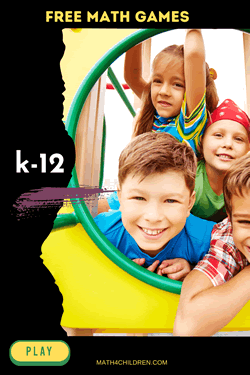Best Practices For Teaching Math Online
Multiplication Games | Addition Games| Subtraction Games | Telling Time Games | Fraction Games |
One of the best practices for teaching math online is to plan ahead of time. Students need to be prepared for annual end-of-year exams, as well as the foundational skills they will need for the rest of their lives. According to Skip Fennell, project director for the Elementary Mathematics Specialists and Teacher Leaders Project at McDaniel College in Westminster, Maryland, back-mapping the beginning of the school year is a good way to keep students on track.
One of the most common mistakes that teachers make when teaching math online is attempting to teach too much material. Instead of letting students complete 50 problems from a book at once, it's important to focus on a few critical skills. Students need to practice different approaches to solving problems, and they should have plenty of practice to demonstrate mastery. Also, remember that when you're teaching math online, you need to make sure your lessons are focused and concise. Keeping the content and learning goals in mind, will ensure you get the best results from your students.
While it's possible to teach multiple topics at once, most students don't want to do 50 problems at once. Instead, they'll want to be able to work on a few of the most challenging ones first. The best way to do this is to use formative assessment. Students can use these tests to determine whether they understand a concept. In addition, they'll get immediate feedback on what they've learned, so they can improve their skills.
Regardless of your chosen delivery method, it's important to keep the learning objectives in mind. While it may be tempting to throw in a new curriculum ideas right from the start, take the time to build a community and build relationships with your students. Allow enough time for students to become comfortable with the online platform and digital tools you plan on using. If you're using a hybrid model, it's best to begin slowly, with a five-minute quiz that confirms whether a student has mastered a particular skill.
Using formative assessment is essential for ensuring that students understand concepts. Adding formative assessment to your lesson plans is crucial for maintaining student engagement. Whether you're using a digital resource for math online or a traditional classroom, you should keep your students' learning goals at the forefront of your mind. You'll need to keep them engaged throughout the entire course. Avoiding distractions is vital to successful online lessons.
As a teacher, it's vital to create a dynamic online classroom. You should provide regular opportunities for students to interact and collaborate. Ideally, the class will have a few days for interaction and discussion. By using video conferencing, students can communicate with their classmates and the instructor in real-time. Keeping the learning goals at the forefront of your lessons, you can focus on delivering quality content. Your students will also benefit from the flexibility of a virtual classroom.
Students do not want to read 50 pages of math problems in one day. They need time to process the information. Choose only three to five examples that are most relevant to the student. A good example should include questions and answers to the questions. It should also include a few activities that are related to the problem. This will keep students engaged throughout the course. Providing a variety of learning activities is crucial to keeping the online classroom lively.
While students will have a greater level of attention and concentration if they are able to see their learning goals, it's important for teachers to ensure that their lessons are focused and succinct. Besides, this will keep students engaged and focused. Many distractions can be challenging, and the math class is no exception. For this reason, it's important to create a learning environment that will promote student engagement and understanding.
The best practices for teaching math online require a focus on learning goals. Identifying critical skills is a good place to start. By separating your lessons into smaller segments, you'll be able to assess student understanding in a better way. It's also important to keep the learning goals at the forefront of every lesson. The more specific the content, the better your students' success will be. If you follow these tips, you'll be well on your way to successful math teaching online.
Tell us what your experience was and how you overcame challenges with this teaching environment.
Free Online Math Games
Multiplication Games | Addition Games| Subtraction Games | Telling Time Games | Fraction Games |

